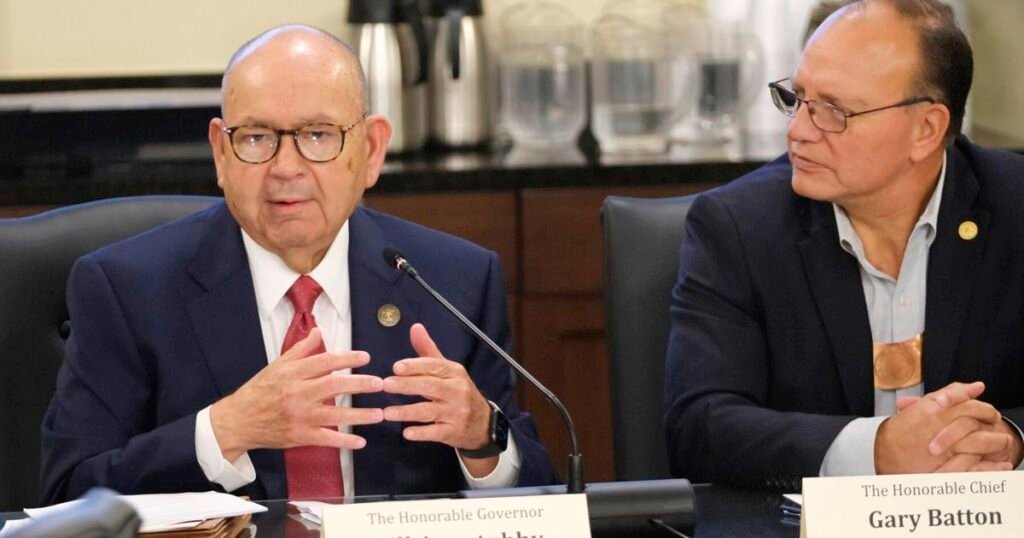Sufficient time has handed since Oklahoma and its tribal governments determined compacts had been higher than courtroom fights that the bitter conflicts they resolved have been largely forgotten, Native leaders and state lawmakers agreed throughout a gathering on the Capitol on Tuesday.
“For the higher a part of our physique, we have no idea the genesis nor the historical past of the compacts which are in place at present,” stated Home Speaker Charles McCall, R-Atoka, who organized what amounted to an off-the-cuff intergovernmental council below the auspices of an interim examine by the Home’s half of the Joint Committee on Inter-Tribal Relations.
Chickasaw Gov. Invoice Anoatubby, one of many few individuals within the room concerned within the first compacts negotiated greater than greater than 30 years in the past, agreed.
“We have misplaced an excessive amount of institutional information about how and why we compact,” he stated. “Most individuals in elected positions within the state proper now merely don’t keep in mind the battle that existed and why we did what we (did).”
Individuals are additionally studying…
Anoatubby recalled the extraordinary battle over tobacco taxes “that nearly obtained violent.” When the Chickasaw Nation stopped remitting gas taxes on gross sales from its journey stops in southeastern Oklahoma, he stated, the state Tax Fee tried to grab his home.
On the similar time, the state was dropping tax income and non-tribal companies had been dropping clients.
Each conditions arose from statutes and courtroom choices to the impact that the state couldn’t tax transactions between American Indians on American Indian belief land.
The U.S. Supreme Court docket, in 1991, dominated that the state may gather taxes on gross sales to non-Indians on belief land, however the state quickly discovered that it had no means to implement assortment besides to encompass the smoke outlets and tribally owned gasoline stations popping up across the state and arrest non-native clients as they left tribal property.
This tax dispute disrupted communities, native companies and state funds.
“It was determined by a small group of tribal leaders that we wanted to place this behind us,” Anoatubby stated. “We would have liked to return to phrases with the state of Oklahoma. 4 of the tribes, which included the Chickasaw, the Choctaw, the Cherokee and the Seminole, approached the governor (David Walters) about … having an settlement. And that is how the primary tobacco compact was generated.”
Coming to phrases on new tobacco compacts is among the duties on the 2024 to-do checklist. The Legislature prolonged, over Gov. Kevin Stitt’s veto, a number of that might have expired this 12 months to the tip of subsequent 12 months.
Related extensions got to motorized vehicle compacts.
With that looming on the political and legislative horizon, McCall determined a assessment of compacts and their historical past was so as.
“I imagine it will likely be essential for the state, for the entire individuals within the state, for compacting to proceed to be a discussion board for options for our state to maneuver ahead,” he stated. “We have to study in regards to the genesis, in regards to the historical past of compacting. That may assist us be extra productive and environment friendly in choices concerning the state of Oklahoma and all of the those that reside inside it.”
Permitting the tobacco and motorized vehicle compacts to lapse, as one for looking and fishing licenses already has, would value the state greater than $80 million a 12 months.
Stitt, and a few of the political forces in his nook, believes he can get an even bigger share for the state. He is additionally made no secret of his need to drive concessions from the tribes on a spread of points, a few of which might basically imply surrendering sovereignty.
“The compacts are usually not actually about management,” Anoatubby stated Monday. “They’re about cooperation. And for greater than 30 years, the tobacco compacts have served us effectively.
“We’ll get extra carried out if we work collectively,” he stated. “The state will profit. The tribes will profit.
“One does not must attempt to get it over on the opposite one. It must be a respectful trade, an association that each the state and tribes can reside with.”
Apart from Anoatubby, Monday morning’s audio system had been Cherokee Principal Chief Chuck Hoskin Jr., Choctaw Chief Gary Batton and Muscogee Second Chief Del Beaver. Every gave a quick assertion and took questions from lawmakers.
A second session with former federal decide and Choctaw Nation Basic Counsel Michael Burrage, Cherokee Lawyer Basic Chad Harsha and Chickasaw Particular Counsel Stephen Greetham elicited some pointed questions, many coping with the consequences of the U.S. Supreme Court docket’s 2020 McGirt Determination.
“There’s a number of misinformation about McGirt on the market,” stated Burrage. “It does not imply the tribes personal the (non-public) land. I feel as time passes the general public is seeing that the tribes aren’t saying they personal the land. … We have seen now that McGirt doesn’t impair particular person possession of property — charge easy property owned by non-tribal members.”
The interim examine continues Wednesday with a session on authorized facets of current compacts.
